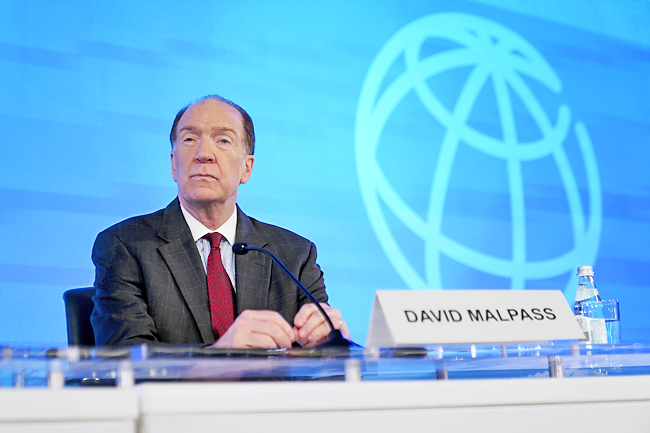WASHINGTON (AFP) – World Bank Chief David Malpass (pic below, AP) announced on Wednesday he would step down nearly a year early, ending a tenure at the head of the development lender that was clouded by questions over his climate stance.
The veteran of Republican administrations in the United States (US) was appointed to the role in 2019 when Donald Trump was president and previously served as Under Secretary of the Treasury for international affairs.
His tenure at the World Bank saw the organisation grapple with global crises such as the COVID-19 pandemic, the Russian invasion of Ukraine and an international economic slowdown.
“After a good deal of thought, I’ve decided to pursue new challenges,” the 66-year-old was quoted as saying in a statement from the bank, having informed its board of his decision.
“This is an opportunity for a smooth leadership transition as the Bank Group works to meet increasing global challenges,” Malpass added.
In recent months, Malpass has come up against calls for his resignation or removal.
Climate activists had called for Malpass to be ousted for what they said was an inadequate approach to the climate crisis and the chorus grew louder after his appearance at a New York Times-organised conference last September.
Pressed on stage to respond to a claim by former US vice president Al Gore that he was a climate denier, Malpass declined several times to say if he believed man-made emissions were warming the planet – responding, “I’m not a scientist.”

He later said he had no plans to stand down and moved to clarify his position, acknowledging that climate-warming emissions were coming from man-made sources, including fossil fuels.
The White House previously rebuked Malpass, with Press Secretary Karine Jean-Pierre saying the expectation was for the bank to be a global leader on climate crisis response.
The bank said in a statement on Wednesday that it has “responded quickly” in the face of recent global challenges, in particular mobilising a record USD440 billion to tackle climate change, the pandemic and other issues.
“Under (Malpass’) leadership, the Bank Group more than doubled its climate finance to developing countries, reaching a record USD32 billion last year,” the statement added.
In a note to staff seen by AFP, Malpass said, “Developing countries around the world are facing unprecedented crises and I’m proud that the Bank Group has continued to respond with speed, scale, innovation, and impact.”
Malpass’ term would have originally ended in 2024.
Environmental groups welcomed his departure.
“Under David Malpass, the @WorldBank lost valuable time in fighting climate change,” tweeted Friends of the Earth.
“Not only did he fail to stop actions that fuel climate chaos and injustice, Malpass pushed for Wall Street-friendly policies that go against the public interest.”
In a statement, Treasury Secretary Janet Yellen said the world has benefitted from his strong support for Ukraine, his work to assist the Afghan people and his commitment to helping low-income countries achieve debt sustainability through debt reduction.
She added that the US looks forward to a swift nomination process by the World Bank’s board for the organisation’s next president.
“We will put forward a candidate to lead the World Bank and build on the Bank’s longstanding work… and who will carry forward the vital work we are undertaking to evolve the multilateral development banks,” she said.
The head of the World Bank is traditionally an American, while the leader of the other major international lender in Washington, the International Monetary Fund, tends to be European.
Prior to assuming his role as World Bank president, Malpass repeatedly lambasted the big development lenders as wasteful and ineffective and called for reforms.



















































